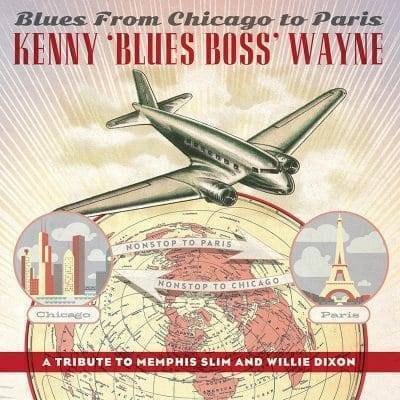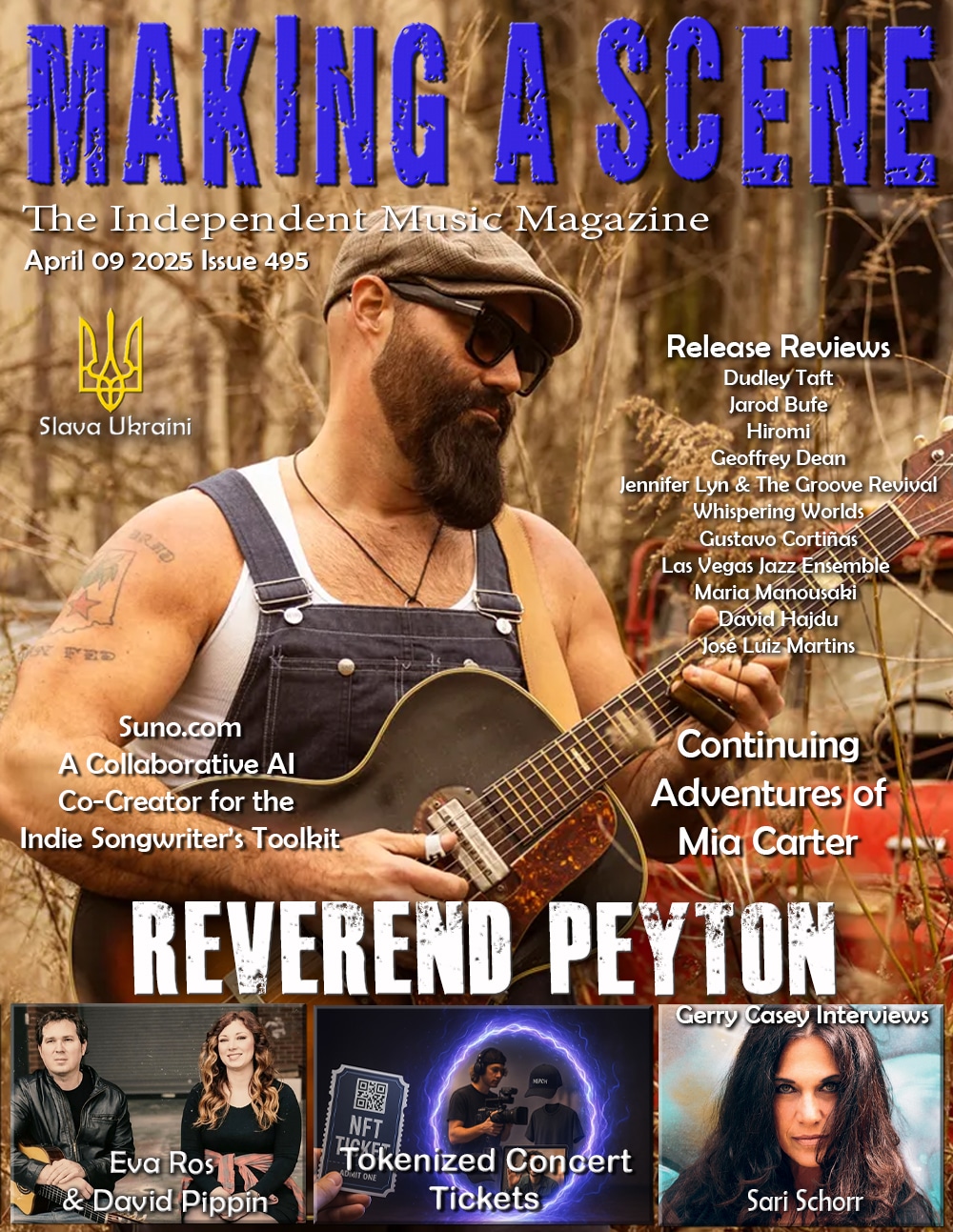Kenny “Blues Boss” Wayne Blues From Chicago to Paris
 Kenny “Blues Boss” Wayne
Kenny “Blues Boss” Wayne
Blues From Chicago to Paris
Stony Plain
JUNO Award-winning and Boogie Woogie Piano Hall of Famer Kenny “Blues Boss” Wayne revisits the bygone era of blues piano trios on Blues From Chicago to Paris. This stripped-down, retro album pays homage to the rollicking piano and bass-slapping legends Memphis Slim and Willie Dixon, respectively. The album title takes its name from these two legends who toured the globe in the late ‘50s and early ‘60s. Bassist Dixon, is, of course, associated with Chicago while pianist Memphis Slim spent the latter part of his career living and playing in Paris. While the album seems simple enough at first glance or listen, there is more going on here than you may think because Wayne is not only one of today’s premiere blues pianists, but also a blues musicologist intent on sharing a few chapters that don’t get much ink in today’s mostly guitar driven world of the blues. Wayne produced and cut these 17 songs with bassist Russell Jackson (B.B. King Band) and drummer Joey DiMarco. Both rhythm mates serve as second vocalists, which is an homage itself as we’ll detail later.
The Vancouver-based Wayne is now 77 and recently has delivered albums stacked with guests playing multiple instruments, giving him some piano solos but not always presenting the piano in the forefront. Urged by a friend to make the piano the primary focus, Wayne studied blues pianists and found the Memphis Slim-Dixon pairing the most to his liking, due to the playfulness of the duo. As one reviews the 17 tracks, it’s not surprising the consummate blues writer of all time, Dixon, penned a dozen with Memphis Slim (aka Peter Chatman) penning the other five. As it turns out, the album doesn’t just cover the Memphis Slim – Dixon pairing, but also Dixon’s stint with the more refined Big Three Trio which recorded prolifically in Chicago during the late ‘40s and early ‘50s, a decade prior to when the two giants toured globally. Wayne intersperses selections from both throughout the sequence.
The album also focuses on Dixon’s slapping bass style which Jackson emulates. In present day this style appears almost exclusively in rockabilly groups but not in blues. Wayne comments, “…You know, in today’s blues, you don’t see or hear this musical camaraderie between piano and bass, which is often seen and heard in jazz groups. We wanted to show that it does work in blues too.” Wayne includes these ‘playful’ songs in homage to that group – the exuberant shuffle “Reno Blues,” the trio vocal rendered “Somebody Tell That Woman,” “Got You On my Mind,” and “After While,” and the boisterous “I Ain’t Gonne Be Your Monkey Man,” and “Don’t Let the Music Die.” Many of these, in the spirit of the original trio, feature all three trio members singing, another element rarely found in the blues music of today.
Dixon’s contributions to the more raucous collaboration with Memphis Slim material include the syncopated “The Way She Loves a Man,” the extended simmering slow blues of “New Way to Love,” the boogie woogie “African Hunch,” the easy rolling “Just You and I,” the boogieing “One More Time,” and the half-sung, half-spoken “I Got a Razor.” Wayne’s Blue Boss Trio does reverent justice to three of Memphis Slim’s biggest hits from the era –The rollicking opener “Rock This House,” (changed to “Rock and Rolling This House’) the stretched out seductive “Messin’ Around,” (adding the parenthetical “With the Blues”), and the bouncy, declarative closer “Wish Me Well.” The gliding “Stewball” and the narrative “Pigalle Love” are the two other Chatman penned tunes. Commenting on the music of the Memphis Slim, Wayne says, “These songs have a smooth jazzy blues feel, which to me feels sophisticated. I know that a lot of musicians of that era were capable of participating in either camp.”
Contemporary bluesman Kenny “Blues Boss” Wayne demonstrates a command of this vintage material from six to seven decades ago, breathing new life into music that today’s listeners may have never heard until now – playful, head-bobbing stuff, eminently accessible and infectious.
- Jim Hynes
Buy Us a Cup of Coffee!
Join the movement in supporting Making a Scene, the premier independent resource for both emerging musicians and the dedicated fans who champion them.
We showcase this vibrant community that celebrates the raw talent and creative spirit driving the music industry forward. From insightful articles and in-depth interviews to exclusive content and insider tips, Making a Scene empowers artists to thrive and fans to discover their next favorite sound.
Together, let’s amplify the voices of independent musicians and forge unforgettable connections through the power of music
Make a one-time donation
Make a monthly donation
Make a yearly donation
Buy us a cup of Coffee!
Or enter a custom amount
Your contribution is appreciated.
Your contribution is appreciated.
Your contribution is appreciated.
Donate Donate monthly Donate yearlyYou can donate directly through Paypal!
Subscribe to Our Newsletter
Discover more from Making A Scene!
Subscribe to get the latest posts sent to your email.













































